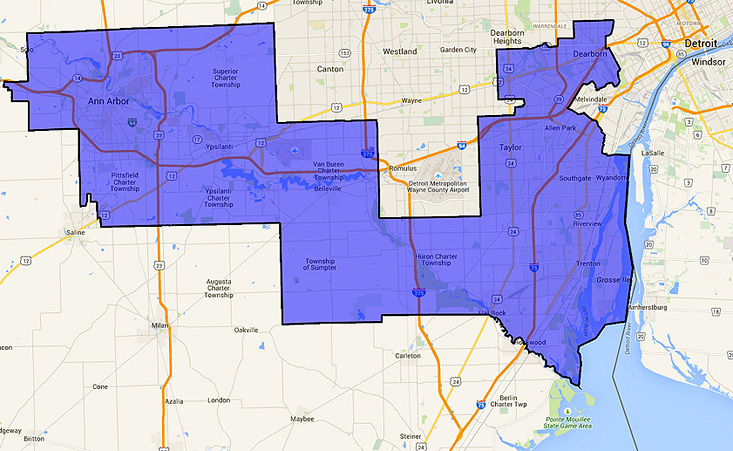Experience, Exposure take Center Stage in Michigan’s 12th Congressional District Race
Democrat Debbie Dingell seeks 2nd term in seat held 8 decades by her family. Third-parties in race hope to be noticed.

No family from Michigan has dominated a seat in the U.S. House quite like the Dingells in the 12th Congressional District.
But this year’s race in the 12th revolves around issues of both experience and exposure to new political parties.

Friendly Rivals
At a recent forum in Ann Arbor, the Democratic and Republican candidates for Michigan’s 12th Congressional District did something rarely seen in this election cycle. They give each other a hug.
Incumbent Democrat Debbie Dingell smiled at her Republican rival, Jeff Jones.
She said it is a small example of something missing in today’s political climate: Civility.
Dingell notes that she has often reached across the ideological aisle to officials like outgoing GOP Congresswoman Candace Miller.

Dingell said, “I believe in working with everybody. I picked up the Detroit Free Press one Sunday morning and saw that a pipeline company had a 91-year-old pipe and was going to look at transporting oil underneath the St. Clair River again. I sent a note to Candice Miller at 6 a.m., said ‘Are you worried about this?’ Because she (represented) the area where I grew up. She said yes. And the two of us, before any of our staffs were up, had devised a plan, written letters. Together. No drama.”
“I have experience that ensures that the working men and women of the 12th District have a voice at the table.” — U.S. Rep. Debbie Dingell (D-MI)
The 12th Congressional District has long been a Democratic bastion.
And for eight decades, a Dingell has represented it in the House.
Debbie Dingell was elected as a freshman two years ago after her husband, John Dingell, retired. John’s father also held the seat.
But Debbie Dingell said she’s worked with officials in Washington, D.C. for years and knows which levers to push.
“And I think that I have experience that ensures that the working men and women of the 12th District have a voice at the table,” Dingell said. “I’ve been a very strong leader against any bad trade deals that would cost us more jobs. I’m a car girl, proud of it, admit that I worked for the auto industry. We need to make sure we keep the auto industry strong in Michigan, but also make sure we keep ourselves at the forefront of innovation and technology.”
But, friendly hugs aside, Republican challenger Jeff Jones charges that a Dingell dynasty does not serve the 12th District well.
Jones said, “We have a family, a father, a son and now a wife. (For) 80 years, the same family. They grew up in Washington. Sure they have an address in Dearborn, but they’re not raising a family here. The decisions they make are for them in Washington, not really for our district.”

Jones says, if elected, he would push to reform education in the district, reconfigure health care options and help create jobs, in part, by turning abandoned buildings into indoor urban gardens.
And he said he differs with Dingell on a deal made with Iran, which he alleged still allows that country the chance to build a nuclear arsenal.
“Interesting she could have a fit on the floor of Congress over the length of a barrel or who could have guns and who can’t have guns,” Jones said. “To fight that sort of issue, but then give Iran nuclear weapons capability is just such an oxymoron.”
Hello, Electorate
Green Party candidate Dylan Calewarts goes further, calling Dingell too much of a Washington insider to adequately address issues like reforming health care or changing the Affordable Care Act he said he uses for his own insurance.

But Calewarts said the Green Party could make those changes because it has no political strings attached.
“The candidates do not run with contributions from corporations or from lobbyists or from super PACs. And why that’s important? I will be held accountable to every word from the tip of my tongue and it won’t be manufactured. The Greens are very frugal, we’re very good with money. I think a Green in Congress would do a lot for the budget,” Calewarts said.
“I’m not campaigning so much against Debbie. We, the Libertarian Party, are going to win some elections this cycle. So that’s a benchmark that gives us legitimacy with the public.” — Michigan Libertarian Party Congressional Candidate Tom Bagwell
For other candidates in the 12th District, the race is as much about promoting their party as an alternative to politics-as-usual, as it is about winning a single Congressional seat.

Libertarian Party candidate Tom Bagwell said he would spur job creation by eliminating the federal income tax and enacting a moratorium on government regulations impacting small business owners and start-ups, especially in economically depressed areas.
But Bagwell said his campaign has an even more important component.
“I’m not campaigning so much against Debbie or any of the other candidates,” Bagwell said. “Realistically, we the Libertarian Party are going to win some elections this cycle, be on track to get over 5% nationally with our presidential ticket. And that has great impact on future ballot access and things like that. So that’s a benchmark that gives us legitimacy with the public.”
That’s also the goal of candidate Gary Walkowicz, who represents the Working Class Party.

He calls it a party born out of frustration among union and other workers he accuses politicians of ignoring until they need their vote.
Walkowicz said, “We have two parties who at the end of the day, whatever they say, support the corporations, the banks and Wall Street. As working people, we cannot just follow the line and think that these folks are going to represent us and do what would benefit working people. We’re a different class than the folks and the people with money. We have our own interests and our own concerns. We have different answers for the problems,” he said.
But, like the other challengers, Walkowicz acknowledged the difficulty of simply making voters aware of political alternatives in the 12th Congressional District when facing an incumbent with name recognition that stretches back roughly 80 years.
